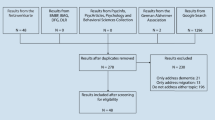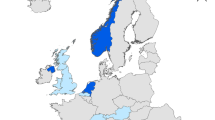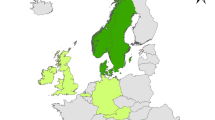Abstract
Background
Despite the care and support needs of migrants affected by dementia differing from the population of the country where they live now, most European countries do not provide specific strategies to address migration in their national dementia plans. The concept of intersectionality provides an innovative approach to dementia care perspectives and methodologies.
Objective
The aim is to define intersectionality and to provide examples of applying the concept to dementia care research, focusing on people with a migration background.
Methods
This article was conceptualized and discussed during virtual INTERDEM taskforce meetings in 2020/2021, while discussing identified literature on intersectionality, migration, and dementia care research.
Results
Using an intersectionality framework allows understanding of a person’s lived experience by considering the dimensionality, co-occurrence and interlocking of factors (e.g., sex/gender, socioeconomic status, ethnicity, migration status, geographic location/place).
Conclusion
Intersectionality can be applied as a conceptual and methodological approach to identify and address gaps in perspectives and in (dementia care) research to overcome the threat of ignorance, exclusion and discrimination.
Zusammenfassung
Hintergrund
Obwohl sich die Bedürfnisse und Bedarfe an Pflege und Unterstützung für Menschen mit Migrationshintergrund sowie deren Zugang zu Gesundheitsleistungen oft von denen anderer Menschen, die von Demenz betroffen sind, unterscheiden, adressieren die meisten europäischen Länder Migration nicht in ihren nationalen Demenzstrategien. Das Konzept der „Intersektionalität“ bietet einen innovativen methodologischen und perspektivischen Zugang zu Demenz.
Ziel der Arbeit
Ziel ist es Intersektionalität zu definieren und Anwendungsbeispiele des Konzepts im Kontext der Demenzversorgungsforschung – mit Fokus auf Menschen mit Migrationshintergrund – aufzuzeigen.
Methoden
Dieser Artikel wurde im Rahmen virtueller INTERDEM-Taskforce-Treffen 2020/2021 konzipiert und diskutiert, um eine auf Intersektionalität fundierte Basis für zukünftige Demenzforschung zu formulieren. Dabei wurde die identifizierte Literatur zu Intersektionalität, Migration und Demenzversorgungsforschung betrachtet.
Ergebnisse
Die Anwendung von Intersektionalität als analytischem Rahmen erlaubt es, die gelebte Erfahrung einer Person zu verstehen, indem die Dimensionalität, das gleichzeitige Auftreten sowie die Verschränkung von Faktoren wie geschlechtlicher Identität, sozioökonomischem Status, Ethnie, Migrationsstatus und geografischem Ort beachtet werden.
Schlussfolgerung
Intersektionalität und intersektionale Analysen können als konzeptioneller und methodologischer Zugang angewendet werden, um Lücken in der Demenzversorgung und -forschung zu identifizieren, zu adressieren und damit möglicher Ignoranz, Exklusion und Diskriminierung entgegenzuwirken.
Similar content being viewed by others
Notes
virtual InterDem Meetings in 2020/2021.
Based on the baseline discussion presented here, we are preparing a scoping review.
References
Ahaddour C, Van Den Branden S, Broeckaert B (2016) Institutional elderly care services and Moroccan and Turkish migrants in Belgium: A literature review. J Immigr Minor Health 18:1216–1227
Alzheimer’s Association (2021) Special report—Race, ethnicity and Alzheimer’s in America. In: Alzheimer’s Association (ed) Alzheimer’s disease facts and figures. Alzheimer’s Association, Chicago
Bartlett R, Gjernes T, Lotherington AT et al (2018) Gender, citizenship and dementia care: a scoping review of studies to inform policy and future research. Health Soc Care Community 26:14–26
Batsch N, Mittelman M (2012) World Alzheimer report 2012: Overcoming the stigma of dementia
Botsford J, Dening H (2015) Dementia, culture and ethnicity. Jessica Kingsley, London
Collins PH (2019) Intersectionality as critical social theory. Duke University Press, Durham, London
Crenshaw K (1989) Demarginalizing the intersection of race and sex: A black feminist critique od anti-discrimination doctrine, feminist theory and anti-racists politics. u. Chi. Legal f. Univ Chic Leg Forum 8:139
Cuesta M, Rämgård M (2016) Intersectional perspective in elderly care. Int J Qual Stud Health Well-being 11:30544
Dawson S, Campbell SM, Giles SJ et al (2018) Black and minority ethnic group involvement in health and social care research: a systematic review. Health Expect 21:3–22
Dilworth-Anderson P, Moon H, Aranda MP (2020) Dementia caregiving research: Expanding and reframing the lens of diversity, inclusivity, and intersectionality. Gerontologist 60:797–805
Giddens A (1994) Living in a post-traditional society. Standford University Press, Standford
Gove D, Nielsen TR, Smits C et al (2021) The challenges of achieving timely diagnosis and culturally appropriate care of people with dementia from minority ethnic groups in Europe. Int J Geriatr Psychiatry 36(12):1823–1828. https://doi.org/10.1002/gps.5614
Hulko W (2009) The time-and context-contingent nature of intersectionality and interlocking oppressions. Affilia 24:44–55
International ASD (2019) World Alzheimer report 2019: attitudes to dementia. https://www.alzint.org/u/WorldAlzheimerReport2019.pdf
Koehn S, Neysmith S, Kobayashi K et al (2013) Revealing the shape of knowledge using an intersectionality lens: Results of a scoping review on the health and health care of ethnocultural minority older adults. Ageing Soc 33:437–464
Köhler K, Dreyer J, Hochgraeber I et al (2021) Towards a middle-range theory of ‘Stability of home-based care arrangements for people living with dementia’ (SoCA-Dem): findings from a meta-study on mixed research. BMJ Open 11:e42515
Kumar BN, Diaz E (2019) Migration health theories: Healthy migrant effect and allostatic load. Can both be true? In: Migrant Health. CRC Press, Boca Raton, pp 17–30
Kuran CHA, Morsut C, Kruke BI et al (2020) Vulnerability and vulnerable groups from an intersectionality perspective. Int J Disaster Risk Reduct 50:101826
Lafleur J‑M, Romero MV (2018) Combining transnational and intersectional approaches to immigrants’ social protection: The case of Andean families’ access to health. CMS 6:1–17
Ma M, Joshi G (2021) Unpacking the complexity of migrated older adults’ lives in the UK through an intersectional lens: A qualitative systematic review. Gerontologist. https://doi.org/10.1093/geront/gnab033. Epub ahead of print
Mahler SJ, Chaudhuri M, Patil V (2015) Scaling intersectionality: Advancing feminist analysis of transnational families. Sex Roles 73:100–112
Mogar M, Von Kutzleben M (2015) Dementia in families with a Turkish migration background. Organization and characteristics of domestic care arrangements. Z Gerontol Geriatr 48:465–472
Monsees J, Hoffmann W, Thyrian JR (2019) Prävalenz von Demenz bei Menschen mit Migrationshintergrund in Deutschland. Z Gerontol Geriatr 52:654–660
Monsees J, Schmachtenberg T, Leiz M et al (2021) EU-Atlas: Dementia & Migration—Estimated number, care situation, and policies regarding people with a migration background with dementia in the EU, EFTA, and UK. Deutsches Zentrum für Neurodegenerative Erkrankungen (DZNE), Rostock, Greifswald
Parveen S, Barker S, Kaur R et al (2018) Involving minority ethnic communities and diverse experts by experience in dementia research: The Caregiving HOPE Study. Dementia 17:990–1000
Sagbakken M, Kumar B (2017) Chapter 6: Perceptions and experiences of migrants and ethnic minorities with dementia and their caregivers. In: Sagbakken M, Kumar B (eds) Dementia, ethnic minorities and migrants: A review of the literature. Norwegian Centre for Migration and Minority Health (NAKMI), Oslo, pp 63–78
Schmachtenberg T, Monsees J, Hoffmann W et al (2020) How is migration background considered in the treatment and care of people? A comparison of national dementia care guidelines in Europe. BMC Public Health 20:1555
Shimmin C, Wittmeier KD, Lavoie JG et al (2017) Moving towards a more inclusive patient and public involvement in health research paradigm: the incorporation of a trauma-informed intersectional analysis. BMC Health Serv Res 17:1–10
Wimmer A, Schiller NG (2002) Methodological nationalism and the study of migration. Eur J Sociol 43:217–240
Winker G, Degele N (2011) Intersectionality as multi-level analysis: Dealing with social inequality. Eur J Womens Stud 18:51–66
Author information
Authors and Affiliations
Corresponding author
Ethics declarations
Conflict of interest
M. Roes, F. Laporte Uribe, V. Peters-Nehrenheim, C. Smits, A. Johannessen, G. Charlesworth, S. Parveen, N. Mueller, C. Hedd Jones, R. Thyrian, J. Monsees and H. Tezcan-Güntekin declare that they have no competing interests.
For this article no studies with human participants or animals were performed by any of the authors. All studies mentioned were in accordance with the ethical standards indicated in each case.
Additional information

Scan QR code & read article online
Rights and permissions
About this article
Cite this article
Roes, M., Laporte Uribe, F., Peters-Nehrenheim, V. et al. Intersectionality and its relevance for research in dementia care of people with a migration background. Z Gerontol Geriat 55, 287–291 (2022). https://doi.org/10.1007/s00391-022-02058-y
Received:
Accepted:
Published:
Issue Date:
DOI: https://doi.org/10.1007/s00391-022-02058-y




